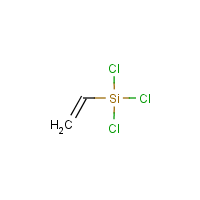Vinyltrichlorosilane
Agent Name
Vinyltrichlorosilane
Alternative Name
Trichlorovinylsilane
CAS Number
75-94-5
Formula
C2-H3-Cl3-Si
Major Category
Toxic Gases & Vapors

Synonyms
Trichlorovinylsilane; A 150; A 150 (VAN); A 150 (silane); Silane, trichloroethenyl-; Silane, trichlorovinyl-; Silane, vinyl trichloro A-150; Silane, vinyltrichloro-; Trichloro(vinyl)silane; Trichlorovinyl silicane; Trichlorovinylsilicon; Union carbide A-150; Vinylsilicon trichloride; VTCS; Vinyl trichlorosilane; Vinyltrichlorosilane, inhibited; [ChemIDplus] UN1305
Category
Chlorosilanes
Description
Colorless to pale yellow liquid with sharp, choking odor like hydrochloric acid; [HSDB]
Sources/Uses
Used as monomers in the production of resins that are electrical insulators and resistant to water and high temperatures; also used to make adhesives and silicones; [HSDB]
Comments
Corrosive to skin; [Quick CPC] A lachrymator; High inhalation exposure can induce pneumonitis and pulmonary edema; [HSDB] Toxicity similar to HCl, which is released as vinyltrichlorosilane hydrolyzes; Corrosive to skin and respiratory tract; [AIHA] Reacts violently with water and moisture in the air evolving heat and hydrogen chloride gas; Causes severe burns; [CAMEO] Short-term exposure causes second- and third-degree skin burns and severe eye injury; [CHRIS] Vinyltrichlorosilane, stabilized (UN1305) has warning of explosive polymerization; [ERG 2016]
Biomedical References
Exposure Assessment
TIH
Yes
Dangerous When Wet
Yes
Vapor Pressure
65.9 mm Hg
Lethal Concentration
LC50 (rat) = 1,611 ppm/1hr
Explosive Polymerization
Yes
Explanatory Notes
LC50 (rat) = 500 ppm/4hr; [RTECS] Not TIH in land-based spills, but TiH substance released when spilled in water; [ERG 2016] VP from HSDB;
NFPA
may ignite at ambient temp
ERPG-1
0.5 ppm
ERPG-2
5 ppm
ERPG-3
50 ppm
WEEL
Ceiling = 1 ppm
Adverse Effects
Lachrymator
Yes
Toxic Pneumonitis
Yes
Dermatotoxin
Skin burns
Diseases, Processes, and Activities Linked to This Agent
Diseases
Occupational diseases associated with exposure to this agent:
Processes
Industrial Processes with risk of exposure: